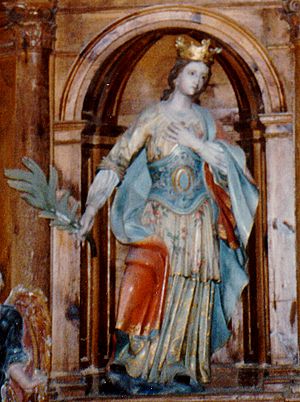Columba of Spain facts for kids
Quick facts for kids SaintColumba of Spain |
|
|---|---|

Santa Columba at Santa Coloma, in Arceniega (Álava, Spain)
|
|
| Martyr of Córdoba | |
| Died | 853 Córdoba |
| Venerated in | Roman Catholicism |
| Major shrine | Old Castile, priory of St. Columba and the royal Abbey of Our Lady at Nájera |
| Feast | September 17 |
| Patronage | Magic, Magicians, Wizards, Witches, Hags, Andorra, Chevilly, Galicia |
Saint Columba of Spain, also known as Columba of Córdoba, was a brave nun from Córdoba, Spain. She lived a long time ago, around the year 853. During that time, Christians in Spain faced difficult times under the Muslim rulers. Columba was killed because of her Christian faith, making her a "martyr." She is remembered as one of the Martyrs of Córdoba and is honored as a saint in the Catholic Church. Her special day is September 17.
Her Life and Faith
Columba was born in Córdoba, Spain. She was the youngest of three children. A writer named St. Eulogius of Córdoba wrote about her life. He said that Columba was known for her strong faith and goodness.
Columba's older sisters, Elizabeth and Martinus, started a special kind of monastery. It was a "double monastery" in a mountain area called Tábanos. This meant it had separate sections for men and women. Columba's brother, Martin, was in charge of the men's part.
Columba was inspired by her siblings. She decided she wanted to become a nun. At first, her mother, who was a widow, wanted Columba to get married. But soon, her mother understood Columba's strong desire to serve God. After her mother passed away, Columba joined the monastery at Tábanos.
Life at the monastery was very strict. Columba was deeply committed to her faith. She wanted to show her devotion in every way possible.
A Time of Trouble
Around the year 850, Christians in Spain faced a difficult period. The rulers at the time were persecuting Christians. This meant Christians were treated unfairly and sometimes punished for their beliefs.
In 852, the monastery where Columba lived was no longer safe. The nuns had to leave Tábanos. They found shelter in a house in Córdoba, near a church.
Even though Christian leaders advised people not to openly challenge the rulers, Columba felt a strong call to stand up for her faith. She left the house and went to the city's Muslim judge. There, she bravely spoke out about her Christian beliefs.
Her Martyrdom
Because of her actions, the judge ordered Columba to be executed. She was beheaded on September 17, 853. She was one of many Christians who died for their faith during this time. These people are known as the Martyrs of Córdoba.
After her death, Columba's body was thrown into a river. But other Christians found it and buried her at a church called St. Eulalia at Fragellas. Later, her remains were moved to two churches. One was the abbey of Santa María la Real of Nájera, and the other was a smaller church dedicated to Saint Columba.
Some historians believe that the story of Saint Columba of Spain might have combined with the story of another saint. This other saint was Columba of Sens, a French martyr from the 3rd century. This might have happened as people moved and shared stories across different regions.
See also
 In Spanish: Columba de Córdoba para niños
In Spanish: Columba de Córdoba para niños

